It Happened To Me: A Rare Disease and Medical Challenges Podcast
The mission of our podcast is to support you, our listeners and to create community, as you confront the toughest challenges in life. All of us will experience health hardships. The real question is how we adapt. That is the focus of It Happened To Me, which wants to help you overcome limitations and live a full and satisfying life. Drawing on their own health challenges, hosts Cathy Gildenhorn and Beth Glassman interview guests who share stories and research to help you succeed in the face of difficult health obstacles. It happened to me…I’m not alone and neither are you. We encourage you to learn more at ItHappenedToMePod.com. Please use the contact form on our website to submit your guest suggestions, comments, questions, ideas, and feedback for the show, you can also email us directly at ItHappenedToMePod@gmail.com. It Happened To Me is created and hosted by Cathy Gildenhorn and Beth Glassman. Steve Holsonback is our media engineer and co-producer. DNA Today’s Kira Dineen is our ...
Episodes
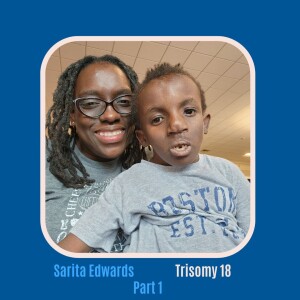
7 days ago
7 days ago
In this powerful episode of It Happened To Me, co-hosts Cathy and Beth sit down with Sarita Edwards, an award-winning advocate, rare disease leader, and mother to Elijah, who lives with Full Trisomy 18, also known as Edwards Syndrome.
Sarita Edwards, MHA is the CEO & President at the E.WE Foundation, a global healthcare advocacy organization for families living with Trisomy 18 (Edwards Syndrome) and other rare diseases. Sarita's son Elijah was diagnosed in utero with Full Trisomy 18 which began her efforts of advocacy and public policy. Sarita is recognized as a 2021 world's top patient expert and social health ambassador. She is an award winning advocate, global speaker, and host of the Being Rare Podcast. As a legislative advocate, Sarita provides insight on policy initiatives within her home state and across the country. Sarita has more than 20 years of professional experience in Healthcare Administration and is a candidate for her Doctorate in Health Science. She holds a Bachelor of Science in Health Science, a Masters in Healthcare Administration, and is a nationally certified Mental Health First Aid Instructor. Sarita lives in North Alabama with her husband Kareem and their five children.
Topics Covered:
What is Trisomy 18 and how it affects the body
Elijah’s diagnosis and how it shaped Sarita’s life and career
The challenges of hearing “incompatible with life” as a parent
Misconceptions about children living with Trisomy 18
Elijah’s involvement in Special Olympics and celebrating milestones
The origin and mission of the E.WE Foundation
Hear more from Sarita Edwards on another podcast in the Gene Pool Media, DNA Today Episode #277. Be sure to subscribe to Sarita’s own podcast, Being Rare Podcast. Sarita mentioned our Executive Producer Kira Dineen’s on Episode #98. She also gave a shout out to Episode #106 exploring sickle cell, especially the misconception of people with sickle cell being drug seekers. Check out E.WE Foundation for all kinds of resources for rare diseases and more.
Stay tuned for the next new episode of “It Happened To Me”! In the meantime, you can listen to our previous episodes on Apple Podcasts, Spotify, streaming on the website, or any other podcast player by searching, “It Happened To Me”.
“It Happened To Me” is created and hosted by Cathy Gildenhorn and Beth Glassman. DNA Today’s Kira Dineen is our executive producer and marketing lead. Amanda Andreoli is our associate producer. Ashlyn Enokian is our graphic designer.
See what else we are up to on Twitter, Instagram, Facebook, YouTube and our website, ItHappenedToMePod.com. Questions/inquiries can be sent to ItHappenedToMePod@gmail.com.
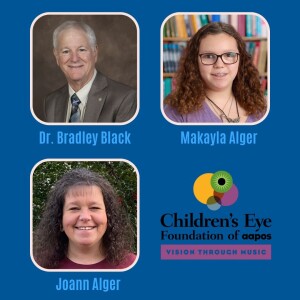
Monday Jun 16, 2025
Monday Jun 16, 2025
In this inspiring episode, we’re exploring the powerful intersection of music and accessibility with three incredible guests: Dr. Bradley Black, a world-renowned pediatric ophthalmologist and founder of the Vision Through Music program, Makayla, a passionate young musician and student in the program, and Maykaya’s mother Joann.
Dr. Bradley Black (he/him) practiced pediatric ophthalmology and strabismus in Baton Rouge, Louisiana. He is past president of the American Association for Pediatric Ophthalmology and Strabismus (AAPOS) and the Louisiana Academy of Eye Physicians and Surgeons (LAEPS). He has served on the boards of directors of AAPOS, the Children’s Eye Foundation, the Smith-Kettlewell Eye Research Institute, and LAEPS. He received the Honor Award, Senior Honor Award, and the Lifetime Achievement Award from AAPOS and the Achievement Award, Secretariat Award, and the Outstanding Advocate Award from the American Academy of Ophthalmology. He was elected to the American Ophthalmological Society. In 2024, he received the Parks Silver Medal, the highest honor awarded by AAPOS and CEF-AAPOS. Dr. Black is active in international ophthalmology. He served on the Orbis International Cybersight Medical Advisory Board and has performed and taught pediatric eye surgery in more than thirty countries.
One of his greatest professional achievements to date is founding the Vision Through Music program of the Children's Eye Foundation, which seeks to increase the number of music teachers who work with blind and partially sighted children nationwide. He and his wife, Cindy, have two children and two grandchildren. In his leisure time, you can often find Dr. Black sailing the Gulf of Mexico on his thirty-five-foot sloop.
Makayla Alger (she/her) is a passionate student of the Children’s Eye Foundation’s Vision Through Music Program (VTM). From an early age, she found joy in singing and playing on her sister’s keyboard. She is currently learning violin and will soon begin voice lessons through the VTM program. Makayla lives with a mutation to the TUBB4B gene, which has led to degenerative vision and bilateral sensorineural hearing loss. Over time, she has lost night vision, experienced a decrease in peripheral vision, and developed nystagmus. Her mother, Joann, vividly remembers taking Makayla to a pediatric ophthalmologist, who determined she would need glasses for life. Initially overwhelmed and unsure whether her young daughter would keep them on, Joann recalls when Makayla looked up at her parents and with a soft voice appreciatively said, “thank you.” From that moment, she never took her glasses off. Joann says the family has gotten creative to make things more accessible at home. Beyond her love of music, Makayla is also the author of “The Way I See It”, a story following Elena, a visually and hearing-impaired red fox who navigates Vermont’s scenic trails using her heightened senses. Along her journey, Elena meets many woodland creatures and teaches them important lessons about awareness, kindness, and understanding. Makayla and her mom Joann hope to raise awareness about TUBB4B genetic testing, as well as encourage more research into its progression and ultimately a cure.
Whether you’re a parent, educator, healthcare provider, or music lover, this conversation will show you just how transformative inclusive programming can be.
Mentioned in this episode:
Vision Through Music program: VisionThroughMusic.org or email contact@visionthroughmusic.org
Academy of Music for the Blind: ouramb.org
Makayla’s book, The Way I See It available here on Amazon.
Girl Scouts of America: GirlScouts.org
Summer Camp IN-SIGHT: in-sight.org/camp
Stay tuned for the next new episode of “It Happened To Me”! In the meantime, you can listen to our previous episodes on Apple Podcasts, Spotify, streaming on the website, or any other podcast player by searching, “It Happened To Me”.
“It Happened To Me” is created and hosted by Cathy Gildenhorn and Beth Glassman. DNA Today’s Kira Dineen is our executive producer and marketing lead. Amanda Andreoli is our associate producer. Ashlyn Enokian is our graphic designer.
See what else we are up to on Twitter, Instagram, Facebook, YouTube and our website, ItHappenedToMePod.com. Questions/inquiries can be sent to ItHappenedToMePod@gmail.com.
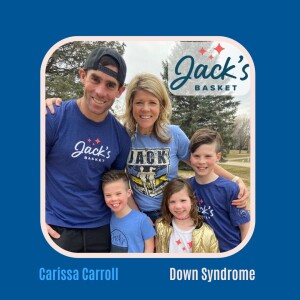
Monday Jun 02, 2025
Monday Jun 02, 2025
In this heartfelt episode we welcome guest Carissa Carroll, M.Ed., Founder and Executive Director of Jack’s Basket, a nonprofit that has transformed the way families experience a Down syndrome diagnosis.
A former educator with degrees from Bethel University and the University of Minnesota, Carissa taught at both the elementary and collegiate levels. But her life—and her mission—changed forever after the birth of her son Jack, and an abrupt, assumptive diagnosis experience. Determined to ensure future families would feel supported, celebrated, and connected, Carissa launched Jack’s Basket in Jack’s honor.
Since then, over 11,000 families in 55 countries have received baskets filled with love, resources, and messages of hope. Carissa now leads her organization full-time and presents to healthcare professionals nationwide on how to deliver diagnoses without bias, while also engaging donors and volunteers who help carry out Jack’s Basket’s powerful mission.
Topics Covered:
What is Down syndrome and how it affects individuals and families
Carissa’s personal story of receiving Jack’s diagnosis and the emotional impact
The inspiration behind launching Jack’s Basket
What’s inside a welcome basket and how it brings comfort to new families
Carissa’s advocacy for bias-free diagnosis delivery in medical settings
Common misconceptions about Down syndrome
Why early connection and community support are crucial
Memorable moments from Jack’s life and the families they’ve served
Advice for new parents, healthcare providers, and loved ones welcoming a baby with Down syndrome
Media highlights, including Carissa’s appearance on The Kelly Clarkson Show and DNA Today podcast (Episode #333)
Jack’s Basket Resources:
Jack’s Basket Website
Request a Basket
Genetic Counseling Webinar: "Communicating Unexpected News"
Stay tuned for the next new episode of “It Happened To Me”! In the meantime, you can listen to our previous episodes on Apple Podcasts, Spotify, streaming on the website, or any other podcast player by searching, “It Happened To Me”.
“It Happened To Me” is created and hosted by Cathy Gildenhorn and Beth Glassman. DNA Today’s Kira Dineen is our executive producer and marketing lead. Amanda Andreoli is our associate producer. Ashlyn Enokian is our graphic designer.
See what else we are up to on Twitter, Instagram, Facebook, YouTube and our website, ItHappenedToMePod.com. Questions/inquiries can be sent to ItHappenedToMePod@gmail.com.
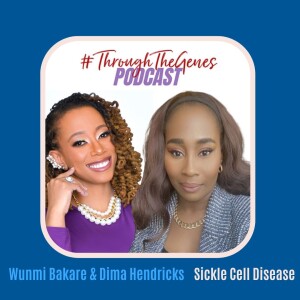
Monday May 19, 2025
Monday May 19, 2025
In this powerful episode of It Happened To Me, co-hosts Cathy Gildenhorn and Beth Glassman are joined by two fierce patient advocates and changemakers in the sickle cell disease community: Wunmi Bakare and Dima Hendricks. Both women are living with sickle cell disease and have transformed their lived experiences into platforms for storytelling, education, and change.
They are also the co-hosts of #ThroughTheGenes, a podcast that launched last year on World Sickle Cell Day (June 19, 2024). The show explores gene therapy and other innovative treatments for sickle cell disease while centering patient voices. With a second season debuting again on June 19th (exactly a month from today!), Wunmi and Dima continue to bring much-needed visibility to a condition that is often misunderstood and underfunded. And they will be joined by a new dynamic host, Christelle Salomon!
Topics Discussed:
What is sickle cell disease and how it impacts daily life
The emotional and physical toll of living with a chronic, invisible illness
Medical gaslighting and how to advocate for yourself
Finding community and realizing you’re not alone
Blending identity, advocacy, and creativity in the public eye
Insights into gene therapy, including CRISPR technology and treatment considerations
Health equity and why access to care must be a priority in the sickle cell space
The power of patient-centered storytelling through #ThroughTheGenes podcast
During the episode Beth referenced a previous episode with someone who has pancreatic cancer, you can listen to Leslie Waldman’s full interview on Episode 25 here.
Catch up with all of season 1 of #ThroughTheGenes podcast right now, before season 2 launches on World Sickle Cell Day on June 19th, 2025.
Both podcasts, It Happened To Me and #ThroughTheGenes are part of Gene Pool Media, the science podcast network. Be sure to check out all these science shows, many of which discuss medical challenges.
Stay tuned for the next new episode of “It Happened To Me”! In the meantime, you can listen to our previous episodes on Apple Podcasts, Spotify, streaming on the website, or any other podcast player by searching, “It Happened To Me”.
“It Happened To Me” is created and hosted by Cathy Gildenhorn and Beth Glassman. DNA Today’s Kira Dineen is our executive producer and marketing lead. Amanda Andreoli is our associate producer. Ashlyn Enokian is our graphic designer.
See what else we are up to on Twitter, Instagram, Facebook, YouTube and our website, ItHappenedToMePod.com. Questions/inquiries can be sent to ItHappenedToMePod@gmail.com.
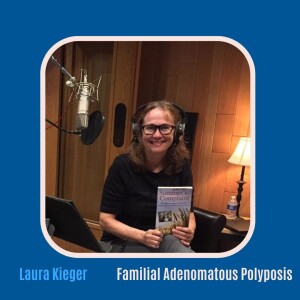
Monday May 05, 2025
Monday May 05, 2025
In this powerful episode of It Happened To Me, hosts Beth Glassman and Cathy Gildenhorn are joined by author, advocate, and healthcare leader Laura Kieger, who shares her family’s deeply personal journey with FAP (Familial Adenomatous Polyposis), a rare genetic condition that significantly increases the risk of colorectal and other cancers.
Laura’s memoir, Summer’s Complaint, chronicles the emotional and medical challenges her family has faced across generations, from diagnosis and genetic testing to coping with loss and finding resilience. As someone who tested negative for the familial mutation herself, Laura also opens up about "survivor’s guilt", the burden of watching loved ones endure cancer, and how her work in healthcare and leadership has informed her approach to caregiving and advocacy.
Whether you're living with a hereditary cancer condition, supporting someone who is, or simply seeking to understand the human side of genetic risk, this episode offers insight, education, and compassion.
Topics Covered:
What FAP is and how it differs from other hereditary cancer conditions
Laura’s family’s diagnosis journey and how it shaped their approach to screening and prevention
The emotional experience of receiving a negative genetic test result when others in your family test positive
The value of genetic counseling and early detection
Misconceptions about FAP and what patients and families should really know
How storytelling can raise awareness and build advocacy for rare diseases
Highlights from Laura’s memoir, Summer’s Complaint, and what she hopes readers take away
Laura Kieger is a healthcare human resources consultant, leadership coach, and author of Summer’s Complaint. With decades of experience improving patient and employee experiences in healthcare settings, Laura brings both professional and personal insight to the conversation around rare diseases and inherited cancer risk. She’s also a passionate advocate and speaker for organizations like the Ronald McDonald House and Care Partners.
Be sure to purchase your own copy of Laura’s memoir Summer’s Complaint; all proceeds go to continuing education credits for healthcare providers about hereditary cancer syndromes. During the episode Laura also mentioned a study about green bananas here and a private Facebook support group here.
Stay tuned for the next new episode of “It Happened To Me”! In the meantime, you can listen to our previous episodes on Apple Podcasts, Spotify, streaming on the website, or any other podcast player by searching, “It Happened To Me”.
“It Happened To Me” is created and hosted by Cathy Gildenhorn and Beth Glassman. DNA Today’s Kira Dineen is our executive producer and marketing lead. Amanda Andreoli is our associate producer. Ashlyn Enokian is our graphic designer.
See what else we are up to on Twitter, Instagram, Facebook, YouTube and our website, ItHappenedToMePod.com. Questions/inquiries can be sent to ItHappenedToMePod@gmail.com.
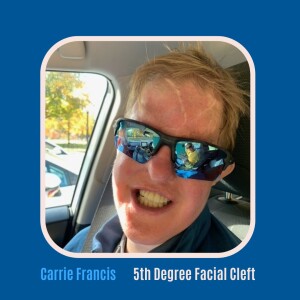
Monday Apr 21, 2025
Monday Apr 21, 2025
Hosts Beth and Cathy sit down with Carrie Francis, a university student and passionate advocate for the blind, visually impaired, and deafblind communities. Carrie, born with a rare 5th-degree facial cleft, has overcome extraordinary medical challenges, including severe blindness and hearing impairment. Despite being told she wouldn’t survive beyond her first week of life, Carrie has defied the odds and is now pursuing a Bachelor’s degree in Psychology while dedicating her life to advocacy and community support.
Carrie shares her journey from childhood surgeries and speech therapy to navigating life as a deafblind person. She opens up about the misconceptions surrounding the deafblind community, the resilience required to thrive despite medical challenges, and the support systems that have helped her along the way.
This episode is a testament to the power of determination, the importance of advocacy, and the strength it takes to rewrite your story against all odds.
Key Topics Discussed:
What is a cleft palate, and how does it differ from a cleft lip?
The medical and emotional challenges of living with a 5th-degree facial cleft.
Navigating life as a deafblind person: adaptations, family support, and advocacy.
Overcoming misconceptions about the deafblind community.
Carrie's journey to pursuing a degree in psychology and her advice for students with disabilities.
Resilience and the factors that helped Carrie defy her initial prognosis.
Impact of the Lions Foundation in Canada
Connect with Us:
Stay tuned for the next new episode of “It Happened To Me”! In the meantime, you can listen to our previous episodes on Apple Podcasts, Spotify, streaming on the website, or any other podcast player by searching, “It Happened To Me”.
“It Happened To Me” is created and hosted by Cathy Gildenhorn and Beth Glassman. DNA Today’s Kira Dineen is our executive producer and marketing lead. Amanda Andreoli is our associate producer. Ashlyn Enokian is our graphic designer.
See what else we are up to on Twitter, Instagram, Facebook, YouTube and our website, ItHappenedToMePod.com. Questions/inquiries can be sent to ItHappenedToMePod@gmail.com.
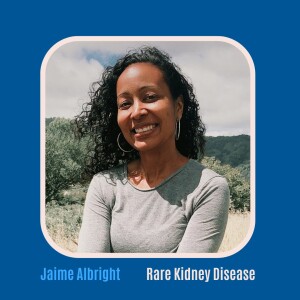
Monday Apr 07, 2025
Monday Apr 07, 2025
Jaime Albright Henighan shares her family’s journey after two of her sons, Joshua and Jorden, were diagnosed with a rare genetic kidney disease called APOL1-mediated FSGS (Focal Segmental Glomerulosclerosis).
Jaime’s story highlights the importance of early detection, education, and advocacy for families navigating this challenging condition. She discusses her partnership with Nephcure, a patient advocacy organization, and her mission to raise awareness about FSGS, especially among individuals of West African descent, who are at higher risk due to the APOL1 gene mutation.
Topics Covered:
What is FSGS?: Understanding APOL1-mediated FSGS and its impact on kidney health.
The Family’s Journey: How high blood pressure led to Joshua’s diagnosis, and the shock of discovering Jorden had the same condition.
The Role of Genetics: Why individuals of West African descent are at greater risk and the importance of genetic awareness.
Early Detection: How identifying symptoms early has helped Jaime’s sons manage their health.
Advocacy and Education: Jaime’s work with Nephcure and her efforts to raise awareness globally, including in Ghana.
Parenting Through Challenges: Jaime’s emotional journey as a mother and her advice for other parents navigating rare diseases.
Key Moments:
Jaime explains how her family discovered FSGS and the challenges they faced in obtaining a diagnosis.
Insights into the genetic factors behind APOL1-mediated FSGS and its prevalence in specific populations.
Advocacy efforts to educate families and healthcare providers about the disease.
Guest Bio:
Jaime is a wife and mother of six. Her family resides in Alpharetta, GA. She is also a Forensic Interviewer and Podcast Producer at Tenderfoot TV. In 2021, her seemingly healthy 17 year old son, Joshua, was randomly diagnosed with high blood pressure. This led to additional testing and a diagnosis of Focal Segmental Glomerulosclerosis (FSGS), a rare genetic kidney disease. Later that year, her 25 year old son, Jorden, was also diagnosed with FSGS. This was shocking to the Albright Henighan family. How could they be at high risk of a disease that they had never heard of? They connected with Nephcure, a patient advocacy organization, for support and resources. They learned that 1 in 8 people of West African descent are at risk of APOL1 mediated FSGS due to a genetic mutation. Thanks to early detection, her sons are stable today but this is a rare outcome for FSGS patients due to a lack of education and barriers in the medical community. They decided to share their story across the United States and even in Ghana. Their goal is to educate and empower others. If caught early, there are medical interventions and clinical research trials that can save native kidneys and lives. There is hope for FSGS patients.
Resources Mentioned:
Nephcure Kidney International: Advocacy and support for families affected by kidney diseases.
Information on APOL1-mediated FSGS and genetic testing.
Tips for recognizing early symptoms of kidney disease.
Connect with Us:
Stay tuned for the next new episode of “It Happened To Me”! In the meantime, you can listen to our previous episodes on Apple Podcasts, Spotify, streaming on the website, or any other podcast player by searching, “It Happened To Me”.
“It Happened To Me” is created and hosted by Cathy Gildenhorn and Beth Glassman. DNA Today’s Kira Dineen is our executive producer and marketing lead. Amanda Andreoli is our associate producer. Ashlyn Enokian is our graphic designer.
See what else we are up to on Twitter, Instagram, Facebook, YouTube and our website, ItHappenedToMePod.com. Questions/inquiries can be sent to ItHappenedToMePod@gmail.com.
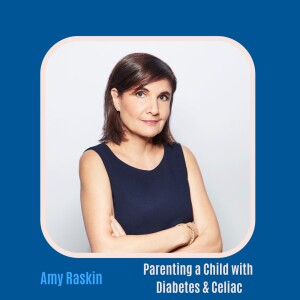
Monday Mar 17, 2025
Monday Mar 17, 2025
Guest Amy Raskin shares her experience parenting a child living with type 1 diabetes (T1D) and celiac disease. Amy shares her personal experiences, the challenges her family has faced, and the strategies they’ve developed to support her son Andrew’s health and well-being.
Amy Raskin is a pioneer in global thematic investing and widely respected as a bold thought leader. As the Chief Investment Officer of Chevy Chase Trust since February 1, 2014, she has propelled the firm to a leadership position in thematic investing, a small, but rapidly growing approach to investing that MSCI recently added to its universe of style categories. Under her leadership, Chevy Chase Trust has outperformed its global benchmark in each of the last nine years; it is in the top decile of managers for the last 10 years. Amy is also a monthly guest on CNBC.
Prior to joining Chevy Chase Trust, Amy was Senior Vice President at AllianceBernstein in New York, serving as Director of Research for Thematic Portfolios, Director of Research on Strategic Change, head of U.S. & Global Growth Equity Research and Chief Investment Officer of AB Venture Capital Fund. The Research on Strategic Change team published in-depth research papers on a wide range of thematic investment topics, such as broadband, China, hybrid vehicles, climate change and molecular medicine.
Earlier, she worked as an investment banker at Lehman Brothers and as a research analyst at Donaldson, Lufkin & Jenrette. Amy graduated from the University of Pennsylvania’s School of Engineering and Applied Science with a Bachelor of Science in Engineering. She currently serves on the Boards of UPenn’s Engineering School and of the T1D Fund, which is a venture capital fund focused on finding a cure to Type 1 diabetes.
Topics Covered:
Understanding Type 1 Diabetes: What T1D is, how it differs from adult-onset diabetes, and the symptoms to look for.
A Family’s Journey: Andrew’s diagnosis, the path to confirmation, and how the family adapted to his needs.
Living with Celiac Disease: The symptoms, diagnosis, and how it intersects with managing T1D.
Daily Life Adjustments: Modifying the home, navigating school and friendships, and encouraging independence.
Sibling Dynamics: How Andrew’s older brother, Jason, has adjusted to the care and attention Andrew requires.
Advice for Parents: Amy’s wisdom for families facing T1D, celiac, or other chronic conditions.
Key Moments:
Amy discusses the emotional and practical aspects of explaining T1D to her children.
Insights into managing dual diagnoses of T1D and celiac disease.
Strategies for balancing a demanding career with the complexities of parenting a child with chronic health conditions.
Resources Mentioned:
T1D Fund
Camp Sweeney
Break Through T1D
Findmeglutenfree.com
Hole In The Wall Gang Camp
Connect with Us:
Stay tuned for the next new episode of “It Happened To Me”! In the meantime, you can listen to our previous episodes on Apple Podcasts, Spotify, streaming on the website, or any other podcast player by searching, “It Happened To Me”.
“It Happened To Me” is created and hosted by Cathy Gildenhorn and Beth Glassman. DNA Today’s Kira Dineen is our executive producer and marketing lead. Amanda Andreoli is our associate producer. Ashlyn Enokian is our graphic designer.
See what else we are up to on Twitter, Instagram, Facebook, YouTube and our website, ItHappenedToMePod.com. Questions/inquiries can be sent to ItHappenedToMePod@gmail.com.
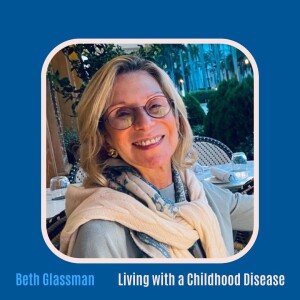
Monday Mar 03, 2025
Monday Mar 03, 2025
Co-host Cathy Gildenhorn takes on the interviewer role to explore the personal story of her co-host, Beth Glassman. Beth shares her journey of living with a childhood autoimmune disease, offering insights into her diagnosis, its impact on her early life, and how it shaped her perspective as an adult.
On Episode #54, Beth interviewed Cathy about her journey to parenthood through infertility and adoption. Now, the roles are reversed as Cathy delves into Beth’s experiences, highlighting the challenges, lessons, and resilience that come from growing up with an autoimmune condition called uveitis.
Topics Covered:
Diagnosis and Early Understanding: Beth’s initial diagnosis, symptoms, and how her healthcare providers and family explained the condition.
Family and Social Dynamics: How her family responded to the diagnosis and whether Beth discussed her condition with friends, teachers, or counselors.
Navigating Childhood and Adolescence: The impact of the disease on her education, sports, and ability to drive.
Living with an Autoimmune Disease: Beth’s thoughts on the potential for passing the condition to her children and how her vision has changed over time.
A Healthy Lifestyle: How her childhood experience influences her approach to health and wellness today.
Advice for Parents: Beth’s guidance for parents raising children with health challenges.
Key Moments:
Beth describes how her autoimmune disease affected her vision and how she explains it to others.
The importance of open communication with family, friends, and educators about living with a chronic condition.
Reflections on resilience and the power of support systems during childhood.
Connect with Us:
Stay tuned for the next new episode of “It Happened To Me”! In the meantime, you can listen to our previous episodes on Apple Podcasts, Spotify, streaming on the website, or any other podcast player by searching, “It Happened To Me”.
“It Happened To Me” is created and hosted by Cathy Gildenhorn and Beth Glassman. DNA Today’s Kira Dineen is our executive producer and marketing lead. Amanda Andreoli is our associate producer. Ashlyn Enokian is our graphic designer.
See what else we are up to on Twitter, Instagram, Facebook, YouTube and our website, ItHappenedToMePod.com. Questions/inquiries can be sent to ItHappenedToMePod@gmail.com.
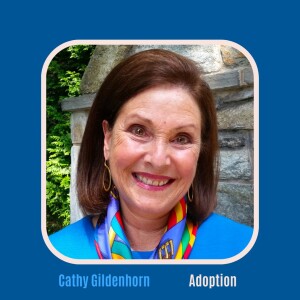
Monday Feb 17, 2025
Monday Feb 17, 2025
In this heartfelt episode of It Happened To Me, we’re turning the microphone inward as co-host Beth Glassman interviews her co-host and dear friend, Cathy Gildenhorn. Cathy shares her deeply personal journey through family planning, recurrent miscarriages, and adoption, offering hope and guidance to listeners navigating similar challenges.
Cathy’s story is one of resilience, love, and the transformative power of creating a family through adoption. From the emotional toll of miscarriages and ectopic pregnancies to the joy of welcoming her children into her life, Cathy provides an honest and inspiring look at her path to motherhood.
Topics Covered:
The emotional and physical challenges of recurrent pregnancy loss (miscarriages)
Understanding ectopic pregnancies and the medical procedures involved
The role of hormones in fertility treatments and their potential health risks
Deciding to pursue adoption: expectations, processes, and challenges
Choosing an adoption agency and navigating the legal requirements
Sharing adoption stories with children and discussing birth parents
Reflections on the adoption experience and advice for others
Cathy’s openness and compassion shine through as she discusses how her experiences have shaped her perspective on family and advocacy. Whether you’re considering adoption, struggling with infertility, or simply looking for an inspiring story, this episode is a must-listen.
Resources Mentioned:
Gladney Center for Adoption
National Council for Adoption
The Barker Adoption Foundation
It Happened To Me’s Episode #41 Colleen Gioffreda also shares her experience adopting children and helping other kids be placed with families.
Connect with Us:
Stay tuned for the next new episode of “It Happened To Me”! In the meantime, you can listen to our previous episodes on Apple Podcasts, Spotify, streaming on the website, or any other podcast player by searching, “It Happened To Me”.
“It Happened To Me” is created and hosted by Cathy Gildenhorn and Beth Glassman. DNA Today’s Kira Dineen is our executive producer and marketing lead. Amanda Andreoli is our associate producer. Ashlyn Enokian is our graphic designer.
See what else we are up to on Twitter, Instagram, Facebook, YouTube and our website, ItHappenedToMePod.com. Questions/inquiries can be sent to ItHappenedToMePod@gmail.com.
